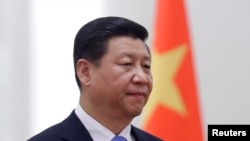China's decision to create a state security committee to oversee its vast security agencies appears to reflect a desire by Beijing to do a better job of dealing with domestic and foreign challenges.
In a Tuesday communique, the ruling Communist Party ended a four-day policy meeting by saying it will set up a state security committee for the first time in order to "perfect the national security system ... and strategy."
The announcement lacked detail, prompting reporters to ask Chinese foreign ministry spokesman Qin Gang for more information in a Wednesday briefing.
Qin said the new security committee will deal with "all forces attempting to threaten China's security" and make them "nervous." He said those forces include "terrorists," "separatists," and "extremists."
Problems at home
Ken Dewoskin, China research director at risk management company Deloitte, told VOA the announcement shows Beijing is "totally focussed" on improving its response to recent domestic unrest.
"[That unrest] involves the far western regions of China where there is quite a lot of agitation, restlessness [and] turbulence of one sort or another," said Dewoskin.
"I think the government now officially acknowledges that the [deadly] incident a few weeks ago in front of [Beijing's] Tiananmen [Square] was in fact a terrorist incident, [that] it was not an accident, because they found materials in the car that indicate that the group was committed to that kind of political agenda. So yes, that [unrest] is now front and center."
In the Tiananmen incident on October 28, three minority Uighur men from western China's autonomous Xinjiang region rammed a car into an entrance of the Forbidden City and set the vehicle on fire, killing themselves and two pedestrians. China denounced it as a terrorist attack.
Other cases of domestic unrest include mass riots by ethnic minorities in Xinjiang in 2009 and the Tibetan autonomous region in 2008.
Overseas challenges
The Communist Party communique also left open the possibility that the new state security committee will try to improve the handling of foreign security issues such as maritime disputes.
In a report published Wednesday, the state-run China Daily newspaper quoted Chinese analyst Li Wei as saying one role of the committee will be "defending China's borders." Li is a director of the anti-terrorism center at the China Institute of Contemporary International Relations.
China has become more assertive in the past year in challenging its neighbors' claims to islands in the East China Sea and South China Sea.
Japan plans to launch its own national security council by the end of this year to deal with issues such as the East China Sea dispute. Tokyo and Beijing both claim sovereignty over uninhabited islands in the resource-rich waters.
In the Chinese foreign ministry's Wednesday briefing, a Japanese reporter asked spokesman Qin if China is creating the security committee because Japan is doing the same.
In a testy response, Qin accused the reporter of insinuating that China views Japan as a threat on par with domestic terrorists. Qin denounced the question as a "trap."
Hong Kong media quoted analysts as saying the Chinese state security committee also is likely to deal with external threats such as cyber attacks.
The committee's membership has yet to be disclosed.
China observers say that if most of the members come from domestic security agencies, the committee is likely to focus more on combating domestic unrest. They say the committee is more likely to concentrate on foreign security issues if it is dominated by diplomatic and military officials.
Enhancing communication
Analyst Li Cheng of the Washington-based Brookings Institution said another reason for China's creation of the committee is a need for its various branches of government to coordinate with each other.
"Certainly you may have some different voices, different interpretations. So the establishment of such an institution can get a better perspective or [give a] more coordinated explanation," Li said.
"Also, military figures, such as a major general, may sometimes comment on foreign policy, but they may or may not reflect the top leadership's view. I think there is a need to have a single institution which can speak in a more authoritative way."
Li cited the recent example of Chinese President Xi Jinping saying China wants to resolve its sovereignty dispute with Taiwan rather than let it be be "passed on from generation to generation." Xi made the comment to a Taiwan official last month.
Li said China's foreign ministry and other institutions were caught off guard by Xi's remarks. China views Taiwan as a renegade province. The island has been self-ruled since splitting from China in a 1949 civil war.
In another example of suspected miscommunication in China's leadership, the Chinese military conducted a sensitive test flight of a stealth fighter jet in 2011, just hours before President Hu Jintao met visiting U.S. Defense Secretary Robert Gates.
At the time, U.S. media quoted U.S. officials as saying President Hu appeared to have no knowledge of the test flight when Gates asked him about it. They said the test flight raised questions about how much control China's civilian leaders had over the military.
Brookings analyst Li said Hu's successor President Xi has greater personal power thanks to strong majority support in China's top decision-making body, the Politburo Standing Committee. Li said the creation of the security committee reflects a further consolidation of Xi's power.
Victor Beattie contributed to this report.




